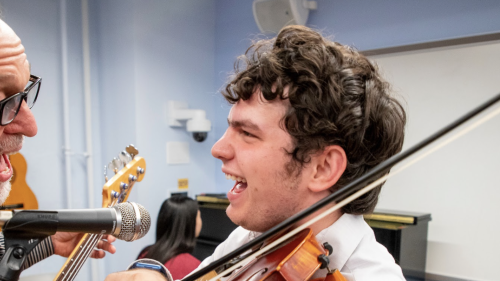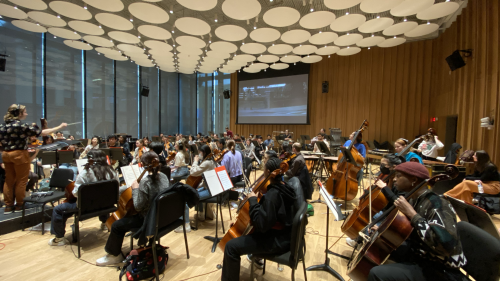What led you to become a music therapist?
I was actually considering graduate programs in international relations when I happened to meet Program Director Kenneth Aigen. We talked about NYU’s Music Therapy Program, and I was instantly drawn to it because of the therapeutic role music played in my life during my mid-20s, when I was first diagnosed with type II bipolar disorder. While I worked with an amazing network of people that helped me learn how to best manage my mental health, one thing that really made a difference for me was connecting with my musical self. I have been a musician for nearly 20 years, and exploring and creating music helped me through that very difficult time. The idea of learning to support others in similar ways influenced my decision to pursue this career.
The other thing that sealed the deal was the stigma and shame associated with seeking mental health support for people of my racial and ethnic background. I am Black, Hispanic, and White, and I have a deep love for my people and community. I ultimately decided to pursue a career as a music therapist when I realized that there was a large gap in mental health services currently existing for people of historically marginalized backgrounds, and that my cultural and musical identities made me uniquely qualified to be a part of closing that gap.
What are you currently working on?
Along with finishing my degree (MA ’23), I spend a lot of time focusing on the definition and structure of anti-oppressive and culturally affirming music therapy practices. I was talking with a mentor of mine recently and she said, “We have never actually seen a just world.” I think about that every day, and it acts as a compass for how I approach my current and future work in the field. A big issue with current evidence-based practices are the inherent biases in the research they’re derived from. Many of the studies were conducted in predominantly-White institutions with predominantly-White participants, and don’t account for the needs of people from marginalized groups. For me, it’s about critically examining how music therapy is currently practiced, identifying existing methods that are potentially harmful, and working to develop therapeutic experiences that honor the experiences and the dignity of all clients.
One of my proudest accomplishments is founding an affinity group called Sanctuary- a closed safe space designated to graduate students who identify as Black, Indigenous, and/or Latinx in the creative arts therapy programs at NYU. It took months of work, but creating and holding this space has been one of the most humbling and rewarding experiences. Having a community in which we can support and learn from one another is essential, and I am consistently working on ways to continue strengthening the bonds we’ve established.
How do you integrate music into your therapeutic work?
I maintain a humanistic and person-first approach to therapy, especially because I’m working not only with evidence-based practices, but with practices derived from my understanding of the individual experiences of my clients. Getting to know the individual and determining how to work with them as a therapist and musician is essential. What I've found through clinical practice with diverse populations is that the strength of the individual is already there. My job is to help them discover and nurture that part of themselves. Connecting through music facilitates this in so many incredible ways that more traditional methods of psychotherapy can’t match.
One of the qualifications to becoming a board-certified music therapist is demonstrated competency on both guitar and piano, as well as vocals. The only formal musical training I’ve had is voice. I’m self-taught on the instruments I play. Guitar is my main instrument, but I’m also a singer, rapper, pianist, drummer, and producer, and play across multiple genres. I think one of the benefits of having taught myself most of what I know is that I don’t always do things ‘the right way’- obviously there are some things you have to do, but I stopped believing that there are any absolutes in how to approach instruments and music. Musical growth is a lifelong process- there’s always more to experience. I taught myself in ways that worked for me, which I think has helped me be successful in supporting clients through music. Rather than sticking with conventional approaches, I can think of ways to step outside the box and adapt to their needs.
One thing that is important to me in my life and career is becoming fluent in Spanish. I believe that committing to working with clients in their native language is one of the many facets of anti-oppressive practice. I see it as not only a sign of respect, but also a means of dignifying the experiences of our clients. Even though I am Hispanic and grew up in a largely-Hispanic neighborhood, I didn’t grow up speaking Spanish. To me, simply being Hispanic isn’t enough- to ethically incorporate this part of my identity into my music therapy practice- I have an obligation to understand the language and the cultural significance of the music I work with.
Talk about your clinical work with the Department of Veterans Affairs (VA).
As part of our training, we have two pre-internship placements during our first year, and commit to a full-year internship placement for our final two semesters. I completed one of my pre-internships at the VA, and decided to return for my full-year placement. My time there has offered me so many learning opportunities, it’s been challenging and very rewarding.
One thing I greatly appreciate about the VA is the emphasis placed on holistic healing. They value creative arts therapists, and see our services as an essential part of recovery. During the first part of my placement, I worked primarily in inpatient psychiatric care. Prior to the pandemic, there were two inpatient wards, one for Veterans being treated for substance-related issues, and the other for those in need of mental health care. At the start of the COVID-19 pandemic, the two psychiatric wards were combined into one that now provides care for both. There are a lot of intricacies that come with working in a confined space with people that have drastically different needs and goals, but having that experience helped me develop strengths as a clinician that I may not have otherwise.
While still working with Veterans, I’m spending the remainder of my internship supporting outpatient psychiatry, oncology, and hospice/palliative care. I see several clients for weekly individual music therapy sessions and recently began working with our outpatient substance abuse recovery group. I also facilitate a weekly community-based guitar group for our Veterans. The learning opportunity I’ve had has surpassed all my expectations, and I’m so grateful for my time there.
What are your post graduation plans?
I plan on taking the board certification exams within a month or two of finishing the semester. After that, the most important thing to me is collaborating with like-minded therapists in institutions that are equally committed to cultural and identity affirming practices. Lived-experience based methods of practice are crucial, as they emphasize and leverage the strengths of individuals and their communities. The ‘lived-experience’ based way of practicing emphasizes and leverages therapist. Long-term, my goal is to take everything I’ve learned- through NYU, my clinical work, and my lived experiences- to develop community-based music therapy programs in Washington Heights- the first place I ever called home.


